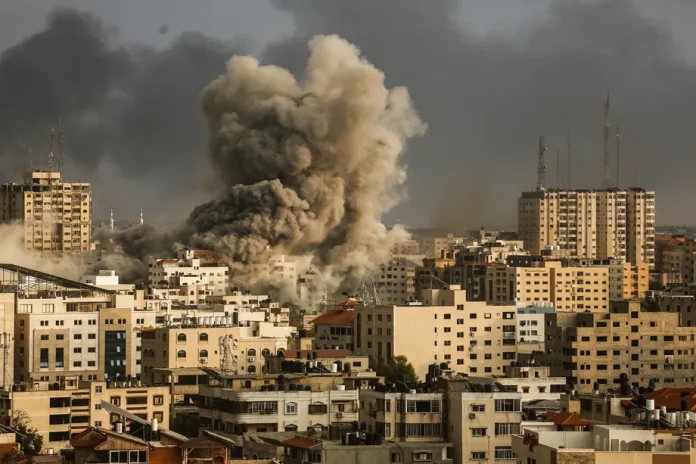The military conflict in the Middle East is unlikely to escalate into World War III, but it will definitely have serious repercussions around the world, according to FP.
In order to understand the consequences that could affect the world, it is important to recall the general state of geopolitics prior to Hamas’ surprise attack on October 7. The US and NATO had been supporting Ukraine since February 2022, hoping to restrain Russia’s ambitions, but Ukraine’s counter-offensive stalled.
The United States also waged a de facto economic war against China, aimed at preventing Beijing from dominating semiconductors, artificial intelligence, and other high-tech fields. Washington viewed China as its main long-term rival, and the Biden administration intended to focus growing attention on this challenge.
In the Middle East, the US planned a complex diplomatic manoeuvre: to dissuade Saudi Arabia from approaching China by providing security guarantees to Riyadh and, perhaps, giving it access to sensitive nuclear technology in exchange for normalising Saudi-Israeli relations.
Critics warned that ignoring the Palestinian issue and failing to respond to the Israeli government’s increasingly violent actions in the Palestinian territories risked eventual escalation.
Then came October 7. More than 1,400 Israelis were killed, and now more than 10,000 people in Gaza, including 4,000 children, died as a result of retaliatory Israeli bombing.
The war is undermining US-led efforts to normalise Saudi-Israeli relations. Although the fighting in Gaza will someday end, the obstacles to an agreement have clearly mounted and will continue to rise as the death toll grows.
Second, the war would hamper US efforts in Asia by shifting attention to the Middle East. About a month ago, US National Security Advisor Jake Sullivan stated that the administration’s “disciplined” approach to the Middle East would “[free] up resources for other global priorities” and “[reduce] the risk of new Middle Eastern conflicts.” However, things turned out differently.
The appointment of Asia specialist Kurt Campbell as undersecretary of state may help Biden devote sufficient time and attention elsewhere, but the latest Middle East crisis still means that fewer diplomatic and military capabilities will be available to Asia in the short to medium term. Moreover, the growing internal turmoil at the State Department, where mid-level officials are frustrated with the administration’s unilateral response to the conflict, only exacerbates the problem.
Thus, the escalating conflict in the Middle East reflects badly on Taiwan, Japan, the Philippines or any other country that faces increasing pressure from China. Beijing’s economic problems have not stopped its actions against Taiwan and in the South China Sea, including a recent incident in which a Chinese interceptor reportedly flew within 10 feet of a patrolling US B-52 bomber.
Furthermore, the Gaza conflict is a disaster for Ukraine, as a Gallup poll conducted between October 4 and 16 found that 41 percent of Americans now believe the US provides too much support to Ukraine, compared to 29 percent in June.
The conflict in Ukraine has become a war of attrition, with the United States and its allies unable to produce enough ammunition to meet Ukraine’s needs. Now that Israel is at war, it is going to get some of the artillery shells or other weapons that would otherwise go to Kyiv.
The problem in Ukraine and the Middle East is bad news for the European Union as well. The war in Ukraine has strengthened European unity despite some minor disagreements. Moreover, the overthrow of the Law and Justice party in Poland’s recent elections was also an encouraging sign.
However, the war in the Gaza Strip revived divisions in Europe: some countries unconditionally supported Israel, while others showed more sympathy for the Palestinians (not for Hamas).
A serious rift has also emerged between European Commission President Ursula von der Leyen and EU chief diplomat Josep Borrell: some 800 EU officials signed a letter criticising von der Leyen for being too biased against Israel. The disagreement also highlights Europe’s diplomatic fragility.
However, this situation plays into the hands of Russia and China by distracting the United States from Ukraine or East Asia. The war gives Moscow and Beijing another argument in favour of a multipolar world order rather than a US-led system. The Hamas attack suggests that Washington is incapable of effectively defending even its closest allies.
Last month, a senior G7 diplomat stated:
We have definitely lost the battle in the global south. All the work we have done with the global south [over Ukraine] has been lost. … Forget about rules, forget about world order. They won’t ever listen to us again.
The Western media is completely absorbed in the conflict in the Middle East, with politicians struggling to make a point about what should be done. Yet in the very week of the Hamas attack, the United Nations reported that some 7 million people are now displaced in the Democratic Republic of Congo, mostly as a result of the violence there. The story barely resonated, although the number of people affected far exceeds the number of victims in Israel or the Gaza Strip.
Lastly, Israeli Prime Minister Benjamin Netanyahu’s failure to defend Israel could tarnish his reputation forever. If this latest failure is accompanied by an unfortunate outcome in Ukraine, other nations will question not America’s credibility, but America’s judgement.
The latter is precisely what matters most, as other states are more likely to heed Washington’s advice and follow suit. However, more and more countries are questioning whether relying on the reactions and actions of the United States to make their own judgements is the right thing to do.
